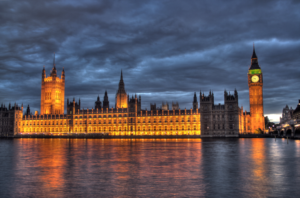No Royal Prerogative, Inaugural Similarities, and South Korean Stumbles
Here’s What You Need To Know
Just this week, Britain’s Supreme Court ruled Prime Minister Theresa May must get approval from Parliament before she can move forward on any plans to execute a Brexit strategy. May had previously argued the Prime Minister had “royal prerogative” to manage the UK’s relationship with the EU. But the Court’s ruling now adds a new hurdle for the Prime Minister’s plans to invoke EU Article 50 – the mechanism for exiting the Union – by March.
So what happens next? Draft legislation, said to have already been underway in preparation for the Court’s ruling, will be presented to the House of Commons and the House of Lords. Lawyers for the Prime Minister have suggested a very simple piece of legislation granting broad powers to Downing Street. But it remains to be seen if backbench Members of Parliament accept a limited role in the process now that they have the authority to dictate specific terms for Brexit.
There are also more legal challenges to come, with two other pending lawsuits in Britain arguing the Prime Minister does not have the power to remove Britain from the single market. And a Dublin court is set to attempt to hear a case they intend to refer to an EU tribunal challenging whether Article 50 could be reversed after it is invoked.
Subscribe to Receive Insights
"*" indicates required fields
Aside from potentially slowing down the Brexit process, the result of all of these lawsuits is expected to be minimal. Since the ruling, May has already announced she will soon release a White Paper outlining her Brexit plans for MPs to review. Even though Parliament can technically block Brexit proceedings, there does not appear to be any significant advocacy or political will left in Britain to remain in the EU. Conservative MPs are likely to fall in behind the Prime Minister, and Labour leaders have already said they do not plan to interfere with the Brexit process.
The most important question is what larger ramifications the precedence of this court ruling has on the power of the British Prime Minister to conduct foreign policy. As explained by the two individuals who brought the case against the government, the lawsuits are less about Brexit and more about placing the power back in the hands of Parliament at large and limiting the executive power of the Prime Minister.
News You Can Use
SKYPING BEYOND THE FILTER
Lost in all of the noisy “controversies” of the White House’s first week with the press corps, is a new White House press office plan to offer four “skype seats” during each press briefing for journalists who do not have a permanent White House press pass and live more than 50 miles away from Washington, DC. The details of the plan will be announced in coming weeks, but the program should have a significant impact on how news is disseminated from the White House. Local news outlets have long since lost the budgets to afford Washington correspondents, and have instead relied on larger news organizations and wire services for their national coverage. This new system will allow local reporters to ask questions that connect national policy to their local communities, and give the White House access to local platforms most Americans read and watch every day. The move will have a strategic and lasting impact on how Trump is perceived where it matters: local communities where voters live.
ENTREPRENEURS’ REFORM PLAN
In a recent article based on a survey of nearly 600 startups, Silicon Valley Bank outlined a number of major policy reforms that start-ups would recommend to President Trump to grow the innovation economy, especially within the tech and healthcare industry sectors. The suggestions included restructuring the U.S. corporate tax code to better incentivize research and development, improving immigration laws to allow easier access to foreign talent for small companies, addressing healthcare costs and regulations, encouraging global trade, and reforming the current FDA approval process. Some of these pieces of advice seem in line with plans the Administration already has, while others might be a tougher sell. With some in Silicon Valley still unsure of what to make of the Trump administration, look for leaders in the innovation economy to try to increase the White House’s awareness of their industry. Their challenge, however, may be their lack of focus or investment in struggling areas in the heartland that the President pledged to help.
THE WRONG OR RIGHT INAUGURAL TONE?
Former speechwriter and Washington Post columnist Barton Swaim wrote an article noting the striking similarities between President Trump’s first inaugural address and President Obama’s 2009 address. Both men criticized Washington elites before launching into a call for newfound national solidarity, but the main difference between the speeches was tone. Swaim argues Obama’s speech seemed detached and academic, while Trump’s felt decidedly more connected to the American people. It seems like many Americans agree with Swain. Many elites in the media have criticized Trump’s speech as too dire, but a new Politico/Morning Consult poll reveals that most Americans had a positive impression of President Trump’s first message to them. This disconnect is yet another example of the political establishment underestimating the power of Trump to connect with the American public.
SOUTH KOREAN STUMBLE
Former UN Secretary-General, Ban Ki-moon, returned to his home of South Korea earlier this month, and was once expected to sail to the nation’s presidency. Ban has earned international respect for his leadership of the UN and followed the appropriate steps to campaign after his homecoming. All of this while the current President, Park Geun-hye, is likely to be impeached in a corruption scandal. But since returning from the bastion of the international political elite, Ban has had to face the cold realities of domestic politics, with a press corps mocking him for small mistakes like misusing a train ticket machine or wearing a bib while feeding an elderly person for a photo op. However, the greatest challenge of all has been Ban’s lack of any domestic political experience and therefore his lack of grassroots support in a country which runs on an intricate network of power brokers. These struggles to connect with domestic political forces may make Ban the international community’s next victim in a long line of global leaders who thought they knew better than the voters.
Mark Your Calendar
Tuesday, January 31 – Year-End Federal Campaign Finance Reports Due



